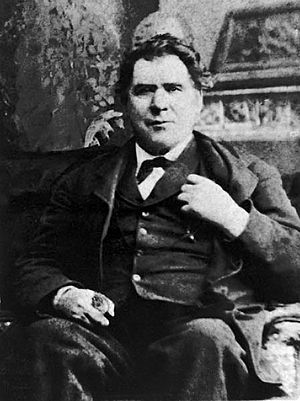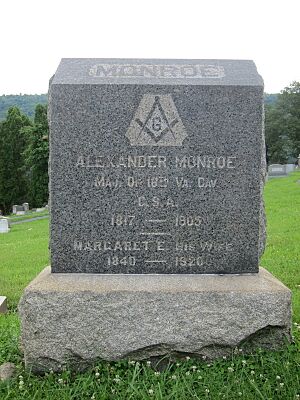Alexander W. Monroe facts for kids
Quick facts for kids
Honorable
Alexander W. Monroe
|
|
|---|---|

Alexander W. Monroe as Speaker of the West Virginia House of Delegates in 1875
|
|
| Speaker of the West Virginia House of Delegates | |
| In office 1875–1877 |
|
| Preceded by | William M. Miller |
| Succeeded by | Eustace Gibson |
| Member of the West Virginia House of Delegates from the Hampshire County district |
|
| In office 1875–1877 |
|
| Preceded by | George Deaver, Jr. |
| Succeeded by | Asa Hiett |
| In office 1879–1883 |
|
| Preceded by | Asa Hiett |
| Succeeded by | Henry Bell Gilkeson |
| Member of the Virginia House of Delegates from the Hampshire County district |
|
| In office 1850–1851 Serving with William P. Stump
|
|
| Preceded by | Robert Massey Powell William P. Stump |
| Succeeded by | James Allen Thomas B. White |
| Personal details | |
| Born | December 29, 1817 Hampshire County, Virginia (now West Virginia), United States |
| Died | March 16, 1905 (aged 87) Hampshire County, West Virginia, United States |
| Resting place | Indian Mound Cemetery, Romney, West Virginia |
| Political party | Democratic Party |
| Spouses | Sarah A. French (first) Margaret Ellen Pugh (second) |
| Relations | Robert Monroe (father) Elizabeth Monroe (mother) |
| Children | James W. Monroe Robert Pugh Monroe Sallie Elizabeth Monroe Haines Ellen G. Monroe Tharp Annie H. Monroe |
| Residences | Barnes Mill, West Virginia Romney, West Virginia |
| Profession | schoolteacher, farmer, lawyer, surveyor, military officer, politician, newspaper editor, and newspaper publisher |
| Military service | |
| Allegiance | |
| Branch/service | |
| Years of service | 1861–1865 (CSA) |
| Rank | |
| Commands | |
| Battles/wars | American Civil War |
Alexander W. Monroe (born December 29, 1817 – died March 16, 1905) was an important American lawyer, politician, and military leader. He lived in what is now West Virginia. Monroe served in the state legislatures of both Virginia and West Virginia. He represented Hampshire County for many years. He was even the Speaker of the West Virginia House of Delegates from 1875 to 1877. Monroe also helped write the West Virginia Constitution in 1872.
Monroe was born in Hampshire County, Virginia (which is now West Virginia) in 1817. When he was 18, he and his siblings became orphans. To support them, he became a schoolteacher. He later worked as a county surveyor and studied law. Monroe was elected to the Virginia House of Delegates (1850–1851). During this time, he helped change the Constitution of Virginia in 1851. He became a lawyer in 1858. In 1861, he bought a newspaper called the Virginia Argus and Hampshire Advertiser. He ran it until the American Civil War began.
During the Civil War, Monroe commanded the 114th Regiment of the Virginia militia. He was a colonel and the oldest person with that rank in the state's militia. His regiment fought in several small battles in Hampshire County. After his regiment was disbanded, Monroe joined the Confederate States Army. He became a major in the 18th Virginia Cavalry. In 1863, he led the rear guard during General Robert E. Lee's retreat from the Battle of Gettysburg. He successfully protected a long wagon train of supplies. Monroe also served in the Virginia House of Delegates throughout the Civil War.
After the war, Monroe returned to practicing law. In 1872, he helped create the new West Virginia Constitution. From 1875 to 1877, he was a member of the West Virginia House of Delegates. He was elected Speaker twice. He was the first person to represent Hampshire County in both the Virginia General Assembly and the West Virginia Legislature. Monroe was also appointed as a director for the West Virginia Hospital for the Insane twice. He served in the West Virginia House of Delegates again from 1879 to 1883. Monroe later retired to his farm and passed away in 1905.
Contents
Growing Up and Family
Alexander W. Monroe was born on December 29, 1817. His birthplace was Hampshire County, Virginia, which is now part of West Virginia. He was the oldest child of Robert and Elizabeth Monroe. His family had Scottish roots. Alexander's great-uncle, Dr. John Monroe, was an early doctor and Baptist minister in Hampshire County.
Alexander had four younger brothers and two sisters. Their names were Robert W. Monroe, James W. Monroe, J. Walker Monroe, Marion Monroe, a Mrs. Snapp, and Sarah Ann Monroe Garrett. His brother, Robert W. Monroe, later became an Indian agent in Idaho. This was a job given to him by United States President Grover Cleveland.
When Alexander was 18, both of his parents passed away. This meant he and his siblings became orphans. Alexander took on the big responsibility of raising and educating his younger brothers and sisters. To do this, he taught school during the cold winter months. In the warmer growing season, he worked on the family farm.
Starting His Career
Monroe began his career by studying surveying. He then started working for the public as the county surveyor for Hampshire County. During his time as surveyor, he mapped out most of the land in the county.
He also studied law in Romney. He learned from a well-known local lawyer named Alfred P. White. While studying law, he was elected to represent Hampshire County in the Virginia House of Delegates. He served there with William P. Stump from 1850 to 1851. Monroe was part of the Virginia House of Delegates when they made changes to the Constitution of Virginia in 1851.
In 1857, he was chosen as a candidate for the Senate of Virginia. He ran as a Democrat for the Hampshire County area. Monroe became a lawyer in 1858 when he was 41 years old. He started his own law practice in Romney. In 1859, he was elected as the county's prosecutor.
In 1861, Monroe and Job N. Cookus bought a newspaper in Romney. It was called the Virginia Argus and Hampshire Advertiser. Their newspaper office was in an old stone building. This building used to be the Romney Academy. It was located behind the Hampshire County Courthouse. Monroe and Cookus worked as the newspaper's editors and publishers. However, the Union Army closed down the newspaper's offices in August 1861. After that, the newspaper was not started up again.
Military Service
When the American Civil War started in July 1861, Monroe became a colonel. He commanded the 114th Regiment of the Virginia militia. At 43 years old, Monroe was the oldest colonel in the Virginia militia.
On October 26, 1861, Monroe's 114th Regiment fought in a small battle. They were up against a unit of the Union Army. This fight happened at what is now Blues Beach. A wire bridge there carried a road across the South Branch Potomac River. Monroe also led 300 soldiers in the Battle of Blue's Gap on January 7, 1862.
Monroe remained the leader of the 114th Regiment until it was disbanded in April 1862. While serving in the Confederate States Army, Monroe also served another term in the Virginia House of Delegates. He attended every legislative meeting during the war. After each meeting, he would go back to his military duties.
After a new law about joining the army was passed, Monroe volunteered. He put together a group of cavalry soldiers. This group joined the 18th Virginia Volunteer Cavalry Regiment. He was chosen as a major in the 18th Virginia Cavalry. This group was also known as the North Western Brigade. While Monroe was in the 18th Virginia Cavalry, it was led by Brigadier General John D. Imboden.
In 1863, Monroe was in charge of the rear guard during the retreat of Confederate forces. This was after the Battle of Gettysburg. He successfully protected a long wagon train that was about 27 miles (43 km) long. Monroe fought for the Confederate Army until the war ended in 1865. After the war, he was released by the Union authorities.
Later Political Career
After the Civil War, during the Reconstruction Era, former Confederate soldiers could not hold public office or practice law in West Virginia. They had to take a special oath. But in 1868, the West Virginia House of Delegates passed a bill. This bill allowed Monroe to practice law without taking that oath. So, he started practicing law again in Romney.
On February 23, 1871, West Virginia announced an election. They needed people to attend a meeting to update the state's 1863 constitution. The election for these delegates happened in August 1871. Hampshire County chose Monroe and James Dillon Armstrong. Monroe and Armstrong represented the county at the West Virginia Constitutional Convention in January 1872 in Charleston.
In 1875, Monroe returned to politics. He was elected as a Democrat to represent Hampshire County in the West Virginia House of Delegates. He served for one two-year term. During this time, Monroe became the Speaker of the West Virginia House of Delegates. He was the first person to represent Hampshire County in both the Virginia General Assembly and the West Virginia Legislature.
In March 1875 and again in March 1876, Governor John Jeremiah Jacob appointed Monroe as a director. This was for the West Virginia Hospital for the Insane in Weston. In June 1876, Monroe was chosen as a delegate from West Virginia's 2nd congressional district. He attended the 1876 Democratic National Convention in St. Louis.
Monroe served again in the House of Delegates for Hampshire County from 1879 to 1883. He was nominated to be the Speaker of the House again, but he lost to George H. Moffet. In 1881, Monroe was part of a committee. This committee was tasked with changing the laws of the West Virginia Code.
Throughout his political career, Monroe continued to work as a lawyer in Romney. In 1887, he and Samuel Lightfoot Flournoy were lawyers for Annie Offner. She was accused of murdering Benjamin Brooks.
Business Ventures
On February 23, 1871, the West Virginia Legislature passed a law. This law created the South Branch Railway Company. This company was responsible for building and running a branch line railroad. This railroad would connect Romney with the main line of the Baltimore and Ohio Railroad at Green Spring. Monroe was named by the legislature as one of the commissioners for this company. His job was to get investors to buy shares in the company.
Later Life and Death
In his later years, Monroe lived on his farm. It was located on the Little Cacapon River in the Barnes Mill community of Hampshire County. Monroe passed away from heart failure on the night of March 16, 1905. He died at his home near Romney. His second wife, Margaret, and their four children survived him. Monroe is buried with his wife Margaret at Indian Mound Cemetery in Romney.
Marriage and Children
In 1852, Monroe married his first wife, Sarah A. French. She was the daughter of John and Eleanor French. Monroe and Sarah had one son, James W. Monroe.
After Sarah passed away, Monroe married his second wife, Margaret Ellen Pugh. She was the daughter of Benjamin and Sarah Pugh. They married on November 21, 1866. Monroe and Margaret had at least four children:
- Robert Pugh Monroe (born October 14, 1867 – died 1924). He married Elwilda Idelle Kidner on March 20, 1906.
- Sallie Elizabeth Monroe Haines (born October 20, 1869). She married Charles William Haines on January 31, 1893.
- Ellen G. Monroe Tharp. She married Wilbur L. Tharp on November 29, 1899.
- Annie H. Monroe
 | Emma Amos |
 | Edward Mitchell Bannister |
 | Larry D. Alexander |
 | Ernie Barnes |


